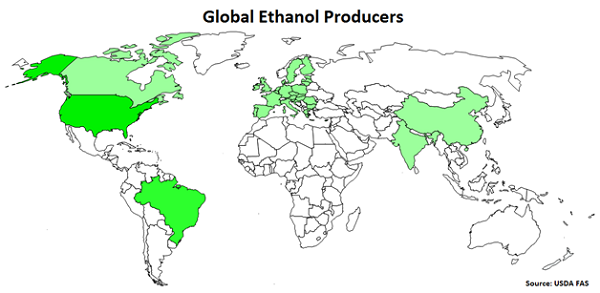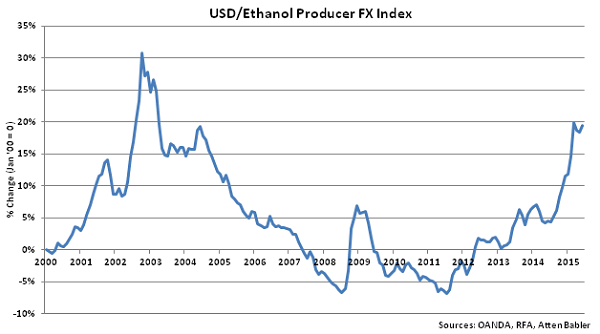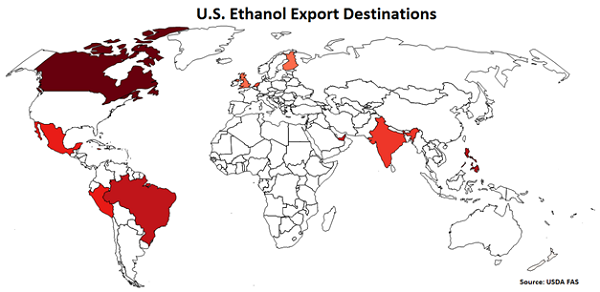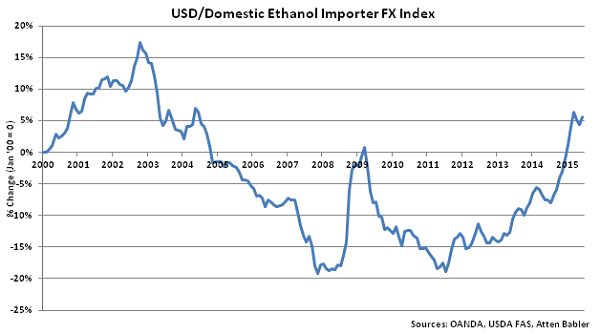Atten Babler Ethanol FX Indices – Jul ’15
The U.S. dollar (USD) remained at elevated levels within the Atten Babler Commodities Ethanol Foreign Exchange (FX) Indices through Jun ’15. The USD/Ethanol Producer FX Index and USD/Domestic Ethanol Importer FX Index both increased throughout the month, with each finishing at the second highest figure experienced in the past ten years.
Global Ethanol Producers:
Major ethanol producers are led by the U.S., followed by Brazil, the EU-28, China, India and Canada.
 USD/Ethanol Producer FX Index:
The USD/Ethanol Producer FX Index increased 1.1 points in Jun ’15 to a value of 119.5. The USD/Ethanol Producer FX Index finished at the second highest figure experienced in the past ten years and has increased 13.2 points since the beginning of 2014 and 8.8 points throughout the past six months. A strengthening USD/Ethanol Producer FX Index reduces the competitiveness of U.S. ethanol relative to other major producing regions (represented in green in the Global Ethanol Producers chart), ultimately resulting in less foreign demand, all other factors being equal. USD appreciation against the Brazilian real has accounted for the majority of the gains since the beginning of 2014.
USD/Ethanol Producer FX Index:
The USD/Ethanol Producer FX Index increased 1.1 points in Jun ’15 to a value of 119.5. The USD/Ethanol Producer FX Index finished at the second highest figure experienced in the past ten years and has increased 13.2 points since the beginning of 2014 and 8.8 points throughout the past six months. A strengthening USD/Ethanol Producer FX Index reduces the competitiveness of U.S. ethanol relative to other major producing regions (represented in green in the Global Ethanol Producers chart), ultimately resulting in less foreign demand, all other factors being equal. USD appreciation against the Brazilian real has accounted for the majority of the gains since the beginning of 2014.
 U.S. Ethanol Export Destinations:
Major destinations for U.S. dairy exports are led by Canada, followed by the Philippines, Brazil, the United Arab Emirates, Peru and Mexico.
U.S. Ethanol Export Destinations:
Major destinations for U.S. dairy exports are led by Canada, followed by the Philippines, Brazil, the United Arab Emirates, Peru and Mexico.
 USD/Domestic Ethanol Importer FX Index:
The USD/Domestic Ethanol Importer FX Index increased 1.2 points in Jun ’15 a value of 105.6. The USD/Domestic Ethanol Importer FX Index finished at the second highest figure experienced in the past ten years and has increased 13.6 points since the beginning of 2014 and 6.6 points throughout the past six months. A strengthening USD/Domestic Ethanol Importer FX Index results in less purchasing power for the traditional buyers of U.S. ethanol (represented in red in the U.S. Ethanol Export Destinations chart), ultimately resulting in less foreign demand, all other factors being equal. USD appreciation against the Canadian dollar and Brazilian real has accounted for the majority of the gains since the beginning of 2014.
USD/Domestic Ethanol Importer FX Index:
The USD/Domestic Ethanol Importer FX Index increased 1.2 points in Jun ’15 a value of 105.6. The USD/Domestic Ethanol Importer FX Index finished at the second highest figure experienced in the past ten years and has increased 13.6 points since the beginning of 2014 and 6.6 points throughout the past six months. A strengthening USD/Domestic Ethanol Importer FX Index results in less purchasing power for the traditional buyers of U.S. ethanol (represented in red in the U.S. Ethanol Export Destinations chart), ultimately resulting in less foreign demand, all other factors being equal. USD appreciation against the Canadian dollar and Brazilian real has accounted for the majority of the gains since the beginning of 2014.

 USD/Ethanol Producer FX Index:
The USD/Ethanol Producer FX Index increased 1.1 points in Jun ’15 to a value of 119.5. The USD/Ethanol Producer FX Index finished at the second highest figure experienced in the past ten years and has increased 13.2 points since the beginning of 2014 and 8.8 points throughout the past six months. A strengthening USD/Ethanol Producer FX Index reduces the competitiveness of U.S. ethanol relative to other major producing regions (represented in green in the Global Ethanol Producers chart), ultimately resulting in less foreign demand, all other factors being equal. USD appreciation against the Brazilian real has accounted for the majority of the gains since the beginning of 2014.
USD/Ethanol Producer FX Index:
The USD/Ethanol Producer FX Index increased 1.1 points in Jun ’15 to a value of 119.5. The USD/Ethanol Producer FX Index finished at the second highest figure experienced in the past ten years and has increased 13.2 points since the beginning of 2014 and 8.8 points throughout the past six months. A strengthening USD/Ethanol Producer FX Index reduces the competitiveness of U.S. ethanol relative to other major producing regions (represented in green in the Global Ethanol Producers chart), ultimately resulting in less foreign demand, all other factors being equal. USD appreciation against the Brazilian real has accounted for the majority of the gains since the beginning of 2014.
 U.S. Ethanol Export Destinations:
Major destinations for U.S. dairy exports are led by Canada, followed by the Philippines, Brazil, the United Arab Emirates, Peru and Mexico.
U.S. Ethanol Export Destinations:
Major destinations for U.S. dairy exports are led by Canada, followed by the Philippines, Brazil, the United Arab Emirates, Peru and Mexico.
 USD/Domestic Ethanol Importer FX Index:
The USD/Domestic Ethanol Importer FX Index increased 1.2 points in Jun ’15 a value of 105.6. The USD/Domestic Ethanol Importer FX Index finished at the second highest figure experienced in the past ten years and has increased 13.6 points since the beginning of 2014 and 6.6 points throughout the past six months. A strengthening USD/Domestic Ethanol Importer FX Index results in less purchasing power for the traditional buyers of U.S. ethanol (represented in red in the U.S. Ethanol Export Destinations chart), ultimately resulting in less foreign demand, all other factors being equal. USD appreciation against the Canadian dollar and Brazilian real has accounted for the majority of the gains since the beginning of 2014.
USD/Domestic Ethanol Importer FX Index:
The USD/Domestic Ethanol Importer FX Index increased 1.2 points in Jun ’15 a value of 105.6. The USD/Domestic Ethanol Importer FX Index finished at the second highest figure experienced in the past ten years and has increased 13.6 points since the beginning of 2014 and 6.6 points throughout the past six months. A strengthening USD/Domestic Ethanol Importer FX Index results in less purchasing power for the traditional buyers of U.S. ethanol (represented in red in the U.S. Ethanol Export Destinations chart), ultimately resulting in less foreign demand, all other factors being equal. USD appreciation against the Canadian dollar and Brazilian real has accounted for the majority of the gains since the beginning of 2014.
